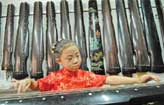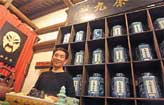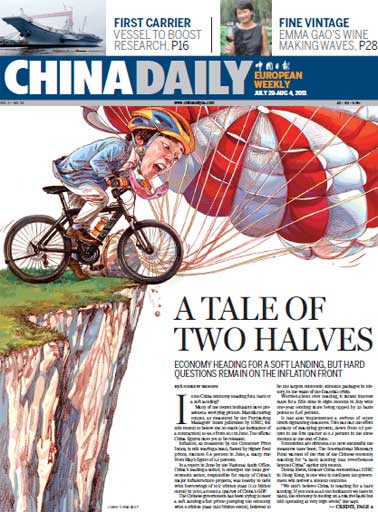Food
Don't panic! It's organic!
Updated: 2011-07-31 10:16
By Ye Jun (China Daily)

 |
|
A young customer tries home-made wine at the fair. Liu Zhe / China Daily |
A Beijing fair is capitalizing on the nature-knows-best agricultural sector boom that's growing in step with food safety scares. Ye Jun reports.
Like many people, Beijinger Xia Xia has become increasingly concerned about food safety and is buying more organic fare.
She still dines out for about half of her meals but says she feels suspicious of fish and oils. And she believes most of the mushrooms she buys in ordinary markets are stale.
Xia, who works in the textile sector, initially turned to the Internet to find organic victuals but discovered the prices were too high and the flavors were too flat.
"When I complained, the seller said taste isn't important," she says. "I disagree."
Then a friend recommended she visit the monthly Beijing Organic Farming Fair.
Xia has visited the fair four times and spent 500 ($77.50) to 700 yuan on mushrooms, vegetables, fruits, pork and millet.
"I've rediscovered the tastes of my childhood," the woman in her 30s says.
"The aroma is important to me. It makes me want to cook. The cook and diner should both be happy, but that only happens with good ingredients."
The fair's organizer, Chang Tianle, estimates that more than 1,500 people visited the most recent fair on July 17 at Rose Garden Park near Madianqiao on the North Third Ring Road. He expects twice as many at the next event in August.
The fair's popularity has been fueled by visitors sharing their experiences on their micro blogs.
Many visitors were foreigners when Japanese artist Emi Uemura founded the fair in September 2010. But most shoppers are now Chinese, which Chang believes indicates greater growth potential.
"Chinese people have a high consumption capacity," she says.
"They are likely to spend a lot, as long as it's for a lifestyle they seek. Our original intention was to provide a food safety solution."
It has evolved into a campaign to encourage more small businesses to engage in organic farming, Chang says.
Farmers are reluctant to engage in organic farming, which requires higher costs and lower profits, unless their products' value can be raised and market access assured, Chang explains.
As farmer Chen Yanhong puts it: "Chemical fertilizers and pesticides produce high yields that look good. I use natural fertilizers and no pesticides and produce low yields that don't look delicious - but they taste much better."
The 41-year-old's 0.133-hectare farm produces green cabbage, cucumbers, eggplants, gourds and peaches in Shunyi district's Jugou village. She also raises 50 hens for eggs.
She was initially a subsistence farmer until her nephew recommended she sell her produce at the fair.
"If I sell vegetables in my village, the price will be the same as those treated with chemicals - 2 yuan per 500 grams," she says. "People would say, 'They're the same as other tomatoes'."
She sells vegetables for 5 yuan per 500 grams at the fair. At the July 17 event, she sold 1,300 yuan of produce and earned a net profit of 400 yuan. Customers praised her produce, especially her eggs, she says.
She sold all 15 kg of organic eggs at 20 yuan per 500 g. She plans to buy another 50 hens to boost production.
"This way, I can pay for my son's vocational school, which costs a lot of money," she says.
Unlike Chen, most of the other vendors are urbanites-turned-farmers.
Duan Qihuang, who rents 5.33 hectares in Shunyi's Baofang village, spent 10 years in Japan.
"The courtyard house I lived in was demolished in 2002, and everybody moved into apartment buildings," he recalls. "Neighbors can never be close like before."
So he moved to the suburbs and his land started to produce after three years.
He initially grew produce for his family and friends but found his yields were too much for them.
Duan also regularly delivers organic food to 30 customers' houses. And he rents out land to city dwellers to grow their own produce fruit and vegetables.
Duan has more customers than he can serve. He says the money is less important than living in a house next to the forest, where his 4-year-old son can play in the sun and eat healthy food straight from their fields.
"I want to live close to nature in a courtyard house with trees," the 50-year-old says. "That's what I call life."
The fair's growing appeal partly comes from its representation of a natural and healthy lifestyle.
Chang, who is a staff member of the NGO Green Ground Union, says modernization comes with drawbacks.
"Industrial agriculture will drive small farmers out of the production chain," she says. "China is walking the path the United States took, but the ramifications will be worse here."
Chang says she has concerns, despite the fair's popularity.

The fair isn't certified by the city's urban management department and, consequently, is technically illegal.
The staff is entirely made up of volunteers, whose departure would be the end, she says.
Chang says organizers are considering registering as an NGO or a company to make the fair legal.
They also hope to find several fixed locations and hold a small fair every week and a big one every month.
The events also feature lectures on food safety and sustainable living that deal with such topics as garbage classification.
"We hope to turn the fair into a green lifestyle event," she says.
IF YOU GO
For the information about the fair, please log on to http://blog.sina.com.cn/farmer-smarketbj or http://weibo.com/farmers-marketbj, or e-mail to farmersmarketbj@gmail.com
E-paper

Double vision
Prosperous Hangzhou banks on creative energies to bridge traditional and modern sectors
Minding matters
A touch of glass
No longer going by the book
Specials

Carrier set for maiden voyage
China is refitting an obsolete aircraft carrier bought from Ukraine for research and training purposes.

Pulling heart strings
The 5,000-year-old guqin holds a special place for both european and Chinese music lovers

Fit to a tea
Sixth-generation member of tea family brews up new ideas to modernize a time-honored business
